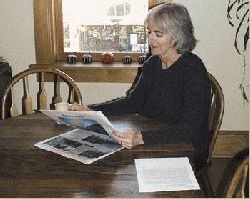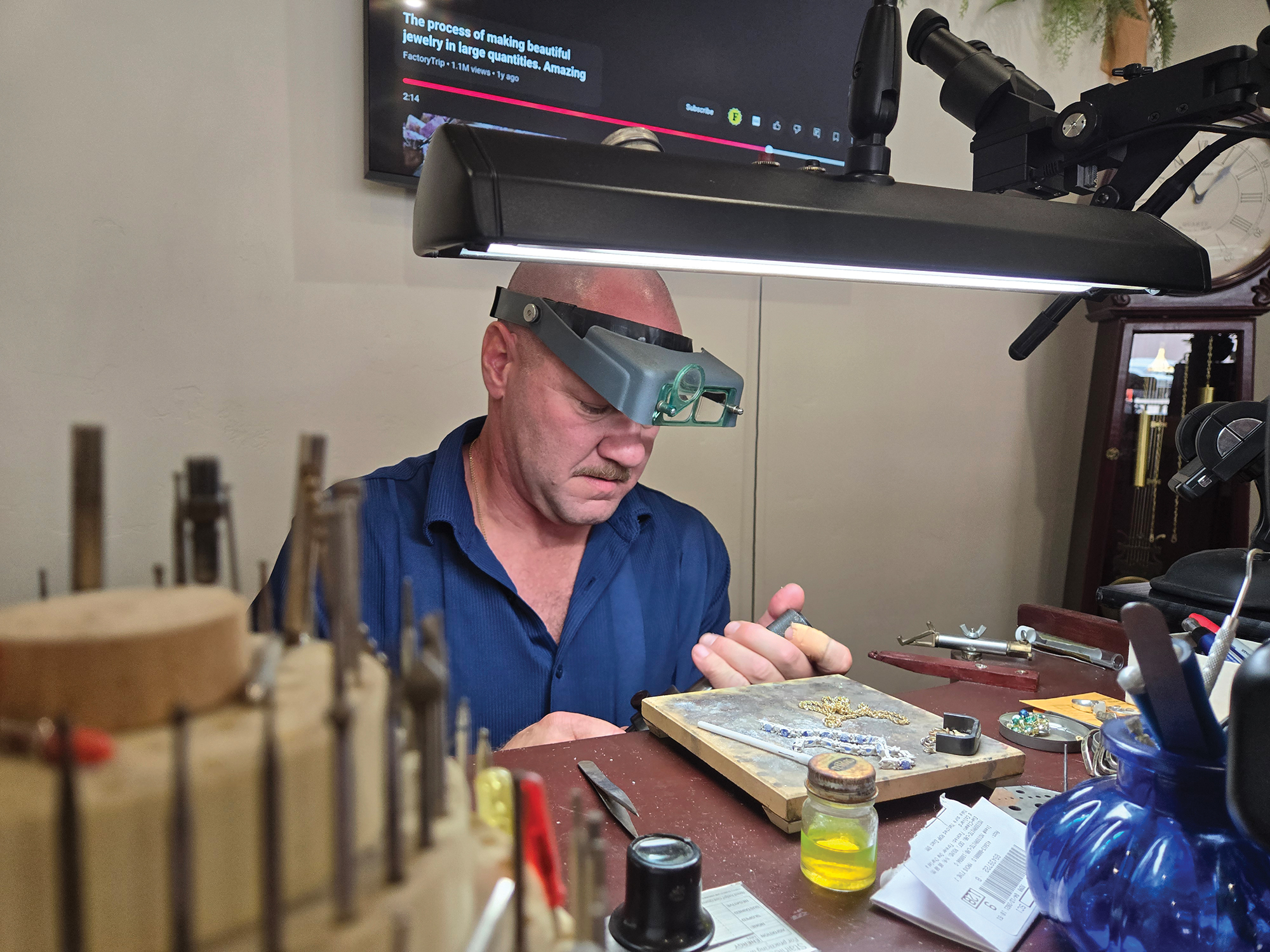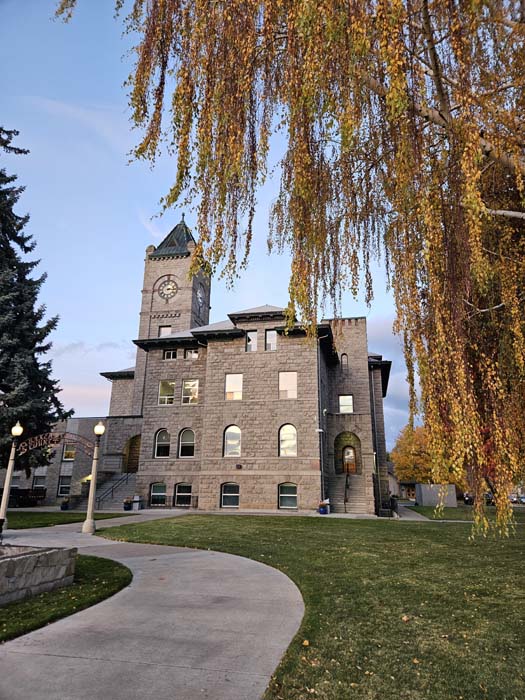Merchants pioneer downtown living
Published 12:00 am Wednesday, November 7, 2001

- Carolyn Kulog relaxes in her apartment above Bettys Books. Baker City Gold and Silver is visible through the window on Main Street below. (Baker City Herald photograph by Kathy Orr).
By MIKE FERGUSON
Of the Baker City Herald
Carolyn and Tom Kulog have lived in the spacious two-bedroom apartment above their downtown Baker City business, Bettys Books, for five years now.
Their digs are historic, befitting their surroundings. The kitchen countertops were once a feature at the old Muegges Drug Store, and one of the restored doors in their apartment was used by patrons of the long-gone store more than half a century ago.
In fact, Carolyn Kulog notes, the apartment is the very site where the old Baker City Bedrock-Democrat an earlier version of the Baker City Herald was once published.
Kulog says theres plenty of upside to living directly above her business. The commute is nice. Its convenient when old friends pop into town for somebody to come up and get me, she said. The only bad thing that comes to mind is theres no yard to get out in, but there are plenty of other yards.
The Kulogs choice to live so close to work and its one that is shared by a handful of other downtown Baker City merchants is nothing new, according to Bill Campbell with the Oregon Economic and Community Development Department.
European merchants have lived over their shops for centuries. But its a lifestyle that the State of Oregon would like more business people to be able to adopt, should they choose.
Ian and Allyson Howarth have lived both above and below their business since opening the Christian bookstore and coffee shop called The Open Door last month.
Their nine-month-old son Jonathon sleeps in the one bedroom upstairs, while the couple sleeps in a loft behind the back wall of the store. The kitchen is actually downstairs from the store.
The floorplan may be a little unusual, but the two say they enjoy being able to put the baby down for his nap while theyre busy minding the store. A baby monitor alerts the shopkeepers the moment Jonathon wakes up, but Allyson jokes that her son is so vocal we hardly need it.
If youre the sole proprietor, its an arrangement I recommend, Ian says of their living and working set-up. Employees, he said, will clean what they are asked to, but if its just you, then keeping your business and your home cleaned and maintained can be a little overwhelming.
Ive always wanted to live like this, and, as it turned out, thats what God had in mind, too, Allyson said.
The only problem, Ian says, is finding a place to relax when customers come by after hours. When we see people eyeing the business after hours, we just hide, he said with a grin. We dont have any boundary issues.
Its a short commute
Rella Browne, who with her husband, Dick, own Baker City Photographic Services and have lived above their business for four years, also have established their boundaries.
Their home telephone number is unlisted, and Rella says she has no problem sending her husband upstairs to cook dinner while she works late into the evening.
I may be working with customers in the evening, but I dont feel like people are taking up so much of my time because were so close, she said. I dont have to be ready to work until 9 in the morning. We both love living here.
Not driving to work each morning means the Brownes put just 3,000 miles on their car every year. It also means Rella has time to take care of the little things including her daily exercise regimen just before opening the shop each morning.
The conveniences are just so awesome, she said.
Creating more downtown housing
The Oregon Legislature has taken up the cause of allowing local governments to grant tax breaks to encourage more housing above downtown commercial areas.
Last summer, legislators passed a law, Senate Bill 763, that will allow local governments to ask the Oregon Economic and Community Development Department to create something called vertical housing development zones within their communities.
The new law goes into effect January 1, 2002, and state economic and community development officials have already begun meeting with stakeholders to develop the administrative rules needed to enable the new law.
The idea, according to the Oregon Downtown Development Association, is to establish tax abatement areas to encourage rehabilitation of buildings for commerical use on the ground floors residential use upstairs.
The housing units could be rented out so that tenants not just store owners could enjoy the downtown lifestyle.
While potential benefits of the new law less traffic congestion, and a more vibrant, 24/7 downtown core may be more desirable in crowded Willamette Valley communities, Bill Campbell of the OECDD said that cities like Baker City may also be well positioned to offer tax abatements.
How it works
The law allows for 20 percent property tax abatement for a commercial building with one residential floor; 40 percent for two; 60 percent for three; and 80 percent for four.
With all its historical buildings and structures, Baker City has taken a slightly different tack than other communities which might opt to use the new law to help redevelop their downtown areas, Campbell said. The number of commercial buildings in downtown Baker City that already have livable space above would potentially help the program succeed here, he said.
Diane Adams of Historic Baker City believes the zone would have at least two beneficial impacts on Baker Citys downtown. The tax abatements would make it a lot less scary for a business owner to sink money into owning a building knowing he or she could live above or behind it without the extra expense of owning a stand-alone home.
In addition, under such a program, HBC could tap into grants it currently has no access to grants that fund the rehabilitation of the interiors of historic structures. This will open a lot of foundations up to us, doors that havent been open to us before, she said.
We dont know whats going to happen until the administrative rules are made, but it could mean a ton of money and a lot of opportunity that we dont want to pass up.
But any decision to apply for such a zone, said Baker City planning director Tim Collins, would have to come from the city council. The benefit of additional downtown development would have to be weighed against the property tax revenue that would be lost under such a plan, he said.
Baker Citys zoning regulations already allow families to live above or behind their businesses without a conditional use permit, Collins said.
But downtown living appeals to more people than just current business owners.
Beginning next month, one former downtown merchant plans to use his upstairs apartment more like a conveniently-located motel room.
Chuck Rouse, a director for the holding company of Pioneer Bank, is refurbishing two apartments above a building he traded for, the former Courtesy Home Furnishings store. His son Kip has done the work.
Rouse says he plans to stay in one apartment each month on the day the bank board meets, and rent out the other apartment.
It makes a lot of sense to redevelop downtown corridors, he said of the tax abatement plan. It gives people great access to services.
Ive always been intrigued by the possibility of living downtown.
Mike Ferguson covers downtown and business for the Baker City Herald. You can reach him at 523-3673 or mferguson@bakercityherald.com.






